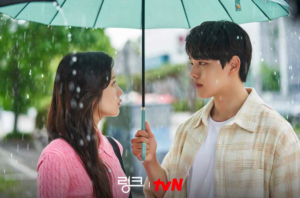
The drama Link: Eat, Love, Kill, could not be more aptly named. Incorporating fantasy, romance, and mystery, Yeo Jin-gu (Hotel del Luna) and Moon Ga-young (True Beauty) play the two protagonists that are linked by elements of each genre. Though Link has its strengths, the drama ultimately stretches itself too thin and lacks the development of a cohesive narrative.
Celebrity chef Eun Gye-hoon (Yeo Jin-gu) used to possess a type of emotional telepathy with his sister, Eun Gye-young (Ahn Se-bin), as they could feel each other’s emotions. Though his ability disappeared when his sister died when they were children, he starts to feel someone else’s emotions once again. His search leads him back to his old neighbourhood, Jihwadong, where he encounters Noh Da-hyun (Moon Ga-young), a stranger that seemingly has no relation to his long-lost sister.
This rest of this review contains spoilers for Link: Eat, Love, Kill.
The emotional telepathy adds a touch of fantasy to the otherwise rom-com mystery, though the link between Gye-hoon and Da-hyun is never explained in depth. The reason for their linkage is quickly explained away towards the climax of the drama, when the truth about Gye-hoon’s sister Gye-young comes to light. It’s implied that Gye-hoon and Da-hyun’s connection did not exist from the day that Gye-young disappeared; the reason behind this time lapse remains a mystery. There are other elements that are also left unexplained, such as how and why Gye-hoon feels Da-hyun’s emotions more strongly than she does his.
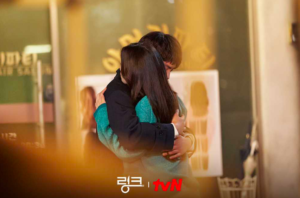
Much of what we learn about this ability comes from flashbacks with Gye-hoon and his sister, but more details about the specific link between the leads would have elevated it to a more convincing connection. Though Gye-hoon and Da-hyun bond through their emotional telepathy, there was the potential to play it up so that it featured more heavily in their developing romantic relationship. They can feel each other’s extreme fear, anger, or sadness, but what about shame, embarrassment, and shyness? If the narrative had worked subtler emotions into the link, it could have better incorporated this key narrative element into their emotional connection.
Nonetheless, Gye-hoon and Da-hyun’s relationship and their growth together is one of the highlights of Link. Their romance does not shy away from typical romance tropes; in their development as a couple, there are misunderstandings, kisses in the rain, and even a forgotten childhood connection. However, Link takes care to showcase depth to both Gye-hoon and Da-hyun. In many ways, Da-hyun is Gye-hoon’s foil. Unlike Gye-hoon, she is always honest and upfront about her feelings; between the two of them, she is the first to acknowledge and confess her romantic feelings. In contrast, Gye-hoon feels guilty about Gye-young’s disappearance, and this guilt impacts his relationships as he struggles to open up to people.
Da-hyun also has a strong support system around her. She has her mom, Hong Bok-hee (Kim Ji-young), and her grandma, Na Chun-ok (Ye Soo-jung). Gye-hoon, on the other hand, has a strained relationship with his mom and does not know where his father is.
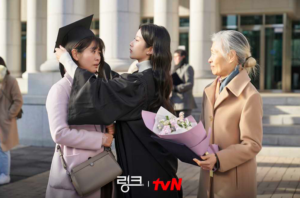
Their differences do not pose a problem in their communication, which is actually one of the highlights of their relationship. Gye-hoon opens up to Da-hyun about his inability to move on from the past, and how he feels abandoned by many people from his life. As a result, being stoic is his defense mechanism. Da-hyun is also honest with Gye-hoon; she tells him about how Bok-hee played a role in Gye-young’s disappearance though she knows it might drive him away from her. The couple do have a happy ending, but it is their progress as individuals and as a couple to that happy ending that is endearing. While Gye-hoon brings peace to Da-hyun when she is feeling the most scared, Da-hyun is the first to break down his walls so that he is comfortable opening up to someone again.
On the other hand, the rekindled romantic relationship between the two police officers Ji Won-tak (Song Duk-ho) and Hwang Min-jo (Lee Bom Sori) fall victim to the drama’s tendency to overload itself. Through flashbacks, it is revealed that the two dated in the past, but aside from that, the two characters are not given the time to fully flesh out their reconnection. With so many plot points to cover and suspects to expose, it’s understandable that the focus is on the romantic relationship developing between Da-hyun and Gye-hoon. Link could have played up their reunification and leaned into the second chance trope to play up the romance factor.
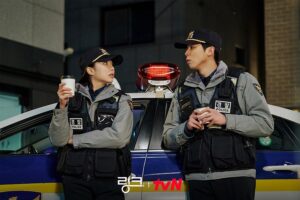
However, Won-tak and Min-jo’s past relationship is mostly to build up Won-tak’s reveal as Han Se-jin, a classmate of Gye-hoon’s whose dad was accused of being Gye-young’s kidnapper and murderer. On the note of murders, much of the driving plot behind Link is a whodunit murder mystery, though instead of hyperfocusing on discovering who the culprit is, the show focuses on exploring how people deal with guilt and remorse for their actions years after Gye-young’s disappearance.
As it turns out, it takes a village to raise a child, and it takes a village to lose one as well. The physical setting of Jihwadong and its residents are important to solving Gye-young’s case, and from the very beginning of the drama the audience is pushed to be wary of the community members. However, the doubts about them are eventually eliminated as the truth surfaces that they are just ashamed of how they contributed to Gye-young’s unresolved disappearance. Truck driver Jo Dong-nam (Yoon Sang-hwa) refused to help Gye-young when she was running away, and he is now haunted by hallucinations of Gye-young asking him for assistance. Police chief Seo Young-hwan (Yu Seong-ju) repeatedly takes out his frustration on the man who they arrested at the time but was later acquitted.
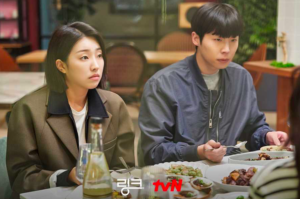
Link takes the time to flesh out the stories of those left behind in the wake of a Gye-young’s disappearance, and it is the main case study used to showcase the different methods people use to justify or forgive themselves. However, the drama includes other examples of people repenting for previous mistakes. Bok-hee and Chun-ok are not actually mother and daughter, but mother and daughter-in-law. Even after Bok-hee and her husband, Da-hyun’s father, divorced, Chun-ok stayed to support Bok-hee because of how badly her son treated Bok-hee. While she did help Bok-hee raise Da-hyun, her primary reason for staying was because she was ashamed of herself for being a bystander when Bok-hee was being mistreated by her son.
Though Link establishes how the residents of Jihwadong are invested in Gye-yong’s disappearance in one way or another, Gye-young’s disappearance only gets a chance to develop in the latter half of the drama. Much of the drama is so bogged down by giving context about the characters and their connections that the end of the drama feels rushed. For much of the drama, the main antagonist is Lee Jin-geun (Shin Jae-hwi), Da-hyun’s stalker, so the reveal of the culprit behind Gye-young’s disappearance lacks the same suspenseful build up.
Link: Eat, Love, Kill struggles to balance its multiple storylines, but the drama does shine in the growth of the endearing lead protagonists, who grow together. After the capture of Gye-young’s murderer and the discovery of her bones, Link forgoes detail about the arrest and instead focuses on the community healing. There is no better scene to sum up the drama than when Da-hyun and Gye-hoon verbally affirm their love for each other in the last episode. It is a sign of their growth, as well as a summary of the show’s message to act in the present to leave no regrets for the future.
(Images via tvN)


